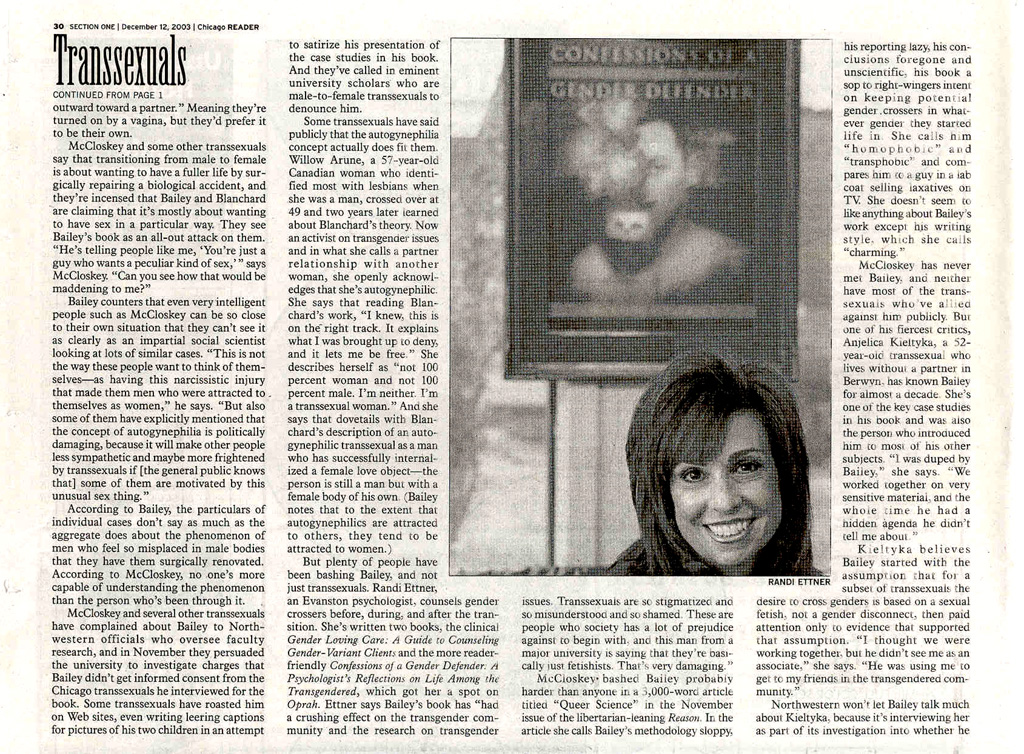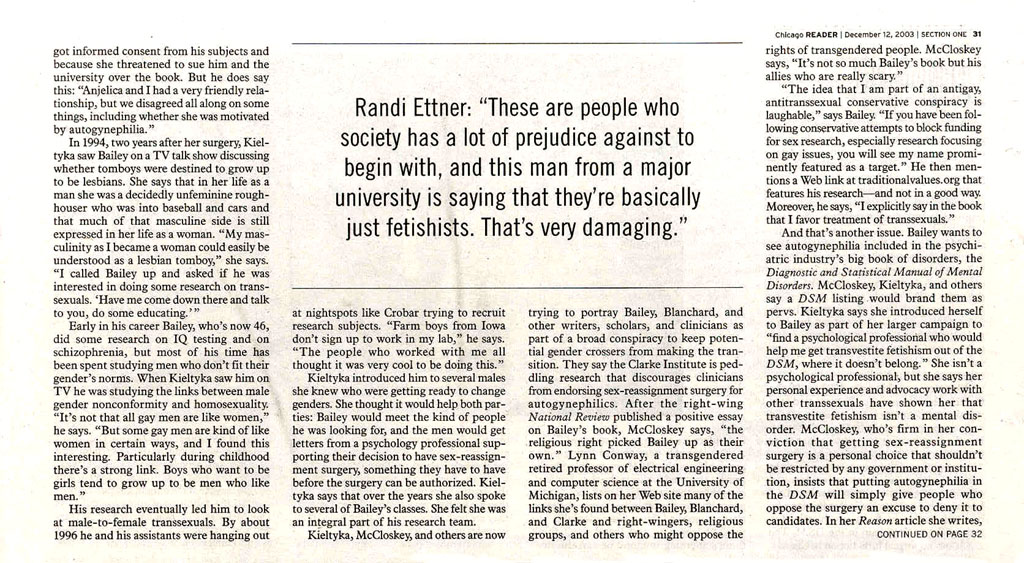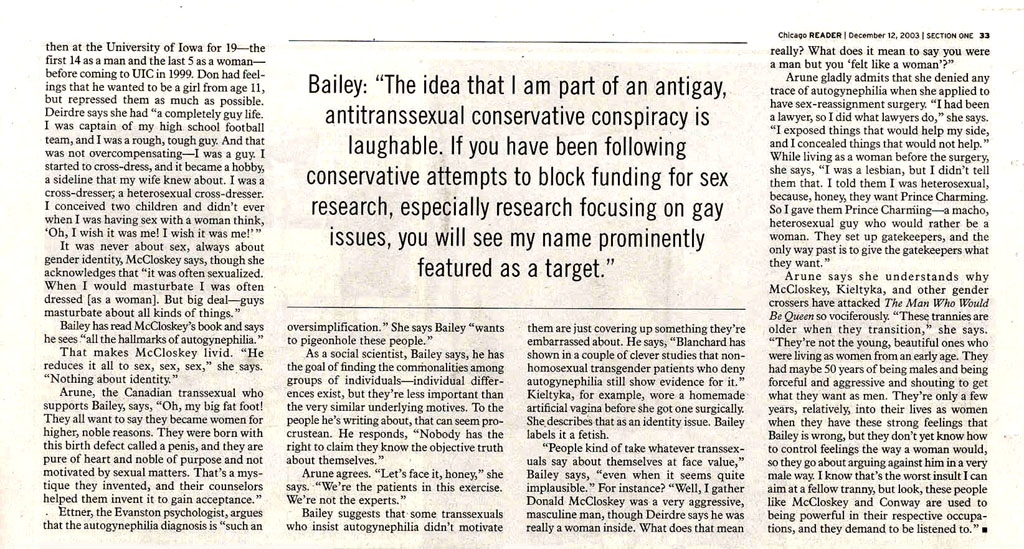For more about Mr. Bailey's principal public spokesperson, Willow Arune,
see the discussion "Who is Arune?" at the end of this page.
See also "Willow Arune" and "Willow Arune: Words and Actions" in Andrea James' website.
|

|
 |
 |
 |
For more about Mr. Bailey's principal public spokesperson, Willow Arune,
see the discussion "Who is Arune?" at the end of this page.
See also "Willow Arune" and "Willow Arune: Words and Actions" in Andrea James' website.
|

|
 |
 |
 |

|

|
Search ListingsClassifieds Please user your browser's back button twice if you wish to return to your search results. Or you may also start a new search. |
|
|||||

|
Subscription
and general information about the Reader. Copyright © 2003 Chicago Reader Inc. |

|

|
Search ListingsClassifieds Please user your browser's back button twice if you wish to return to your search results. Or you may also start a new search. |
|
|||||

|
Subscription
and general information about the Reader. Copyright © 2003 Chicago Reader Inc. |

|

|
Search ListingsClassifieds Please user your browser's back button twice if you wish to return to your search results. Or you may also start a new search. |
|
|||||

|
Subscription
and general information about the Reader. Copyright © 2004 Chicago Reader Inc. |

|

|
Search ListingsClassifieds Please user your browser's back button twice if you wish to return to your search results. Or you may also start a new search. |
|
|||||

|
Subscription
and general information about the Reader. Copyright © 2004 Chicago Reader Inc. |

|

|
Search ListingsClassifieds Please user your browser's back button twice if you wish to return to your search results. Or you may also start a new search. |
|
|||||

|
Subscription
and general information about the Reader. Copyright © 2004 Chicago Reader Inc. |
Willow Arune is a Canadian who recently underwent vaginoplasty (SRS) and has gone on to become a principal spokesperson for J. Michael Bailey.
As you will learn in the newspaper article below, Arune has an unusual gender trajectory. Nevertheless, Arune is put forward by Mr. Bailey as being a "representative transsexual".
Arune's urge to "change sex" came on suddenly, rather late in life:
"Willow decided to reverse her gender after a harrowing two years as a man in Thailand. (S)he travelled there in 1995 to make a loan transaction with two Americans who authorities later learned had forged documents. All three were arrested, and Willow - then known as Will - spent six weeks in a Bangkok prison, where he was repeatedly raped by the guards....When he got out on bail, the Thai authorities withheld his passport. He sought psychological counselling, and his therapist suggested becoming a woman...."
It isn't clear what exactly happened in that Thai prison to make Arune to later think that "becoming a woman" would be a good idea. Neither the news reports nor Arune's later statements get into this. However, it is clear from Arune's later statements that the motivation to undergo a vaginoplasty operation was a sudden and profoundly sexual one. Arune apparantly had never considered a sex change until the therapist suggested it, and denies that it had anything whatsoever to do with having female gender feelings.
Acting on the counselor's suggestion, Arune entered a Canadian gender program and was eventually approved for vaginoplasty under a diagnosis of autogynephilia. The diagnosis of "autogynephilia", a word invented by Canadian Ray Blanchard to describe particular forms of sexual paraphilia, has sometimes led to such approvals for vaginoplasty (by Canadian gender clinics) in persons showing no signs of the gender dysphoria (GID) exhibited by most transitioners.
Since undergoing vaginoplasty surgery, Arune has recently gone on to upstage even Anne Lawrence as the principal public spokesperson for Mr. Bailey and Mr. Blanchard and their scientific theory of transsexualism. As indicated in the Reader article, Blanchardian theory says that transsexuals are either (i) extremely gay men who undergo vaginoplasty so as to have many male sex partners, or (ii) they are sexual paraphilics suffering from "autogynephilia".
Arune clearly believes that most transsexual women undergo SRS (vaginoplasty) for the same reasons that she did. She appears to believe, as Bailey and Blanchard do, that some kind of overpowering sexual feelings, perhaps triggered by some kind of psychic break or mental disease, trigger the urge to obtain a vagina of one's own.
As a result, Arune has become an avid spokesperson for Blanchard and Bailey's concept of "autogynephilia", which asserts that someone like her is now a "man in a woman's body" who became that way for autosexual reasons, and who does not have a female gender identity. Furthermore, as did Anne Lawrence before her, Arune pokes fun at trans women who claim to have female body feelings and a female gender identity, considering such claims to be ridiculous. Instead she believes that most trans women are just like her (i.e., autogynephilic sexual paraphilics), and that if they deny it - then they are lying.
In the Chicago Reader article "Sex and Transsexuals", Mr. Bailey's yet again presents his "new scientific claim" that all transsexuals lie about why they undergo "sex changes". He claims that the mainstream scientific community is totally wrong in their consensus that "gender dysphoria" (GID) is the condition that motivates most gender crossers.
Instead he insists that transsexuals undergo vaginoplasty for exotic sexual reasons, and to "prove" this claim Mr. Bailey is increasingly relying on W. Arune as his representative transsexual spokesperson.
However, is W. Arune truly representative? Or is there something wrong with this picture?
See also:
1. "Desperate
times lead to desperate actions in the Bailey camp: Bailey’s spokesperson
Arune makes false accusations of racism in an attempt at censoring the
Bailey investigation website," by Lynn Conway, April 18, 2004.
2. "A
Quiet Victory: J. Michael Bailey is forced to resign as Chair of Psychology
at Northwestern University," by Lynn Conway, December 19, 2004.
3. "Willow Arune" and "Willow Arune: Words and Actions" by Andrea James, October 14, 2005, provide extensive documentation of Arune's background and activities, including references to sources of information about Arune.
The Kelowna Daily Courier
January 27, 1999
Willow sculpts a life
by Don Plant
Meeting Willow Arune for the first time can be a little unsettling.
After all, you don't have to look hard to realize there's a man
inside the make-up, dress and heels. But Willow's easy manner
and candour about her appearance put you at ease in seconds. This
is no ordinary transsexual, if there is such a thing.
Willow, 52, has lived in Kelowna since June and is "in transition." She wants to undergo surgery to alter her male body, but first has to take female hormones for at least a year. She must also dress and behave as a woman to prepare psychologically for the operation.
A former lawyer, entrepreneur and TV host, Willow decided last year to throw off the male persona and become the woman she wanted to be. When we met, she wore red nail polish, a fine-knit turtleneck with scarf, and gold earrings, necklace and bracelets. Her blond hair was combed down to her shoulders.
Willow moved to Kelowna in June and began work as a writer. She's likely the first transsexual anyone here has knowingly met. And so far, she's received no more attitude or abuse here than she'd get in Vancouver. "I expected all sorts of problems," she said in a low but effeminate voice. "Instead, I found a warmth and kindness. I've found many new friendships, and some in the most unexpected places."
On New Years Eve, Willow attended a wedding at First Baptist Church and the reception that followed. She was the only non-Baptist there. She braced herself for a few hostile stares or comments, but instead found everyone was "really kind."
She goes into local shops and frequents a local pub. She lay on the beach last summer wearing a woman's bathing suit with a skirt. Even though Kelowna is reputed to be a conservative Christian community, negative experiences have been rare.
One woman who interviewed her for a job ended the conversation when Willow revealed her story. Another time, a man said he "didn't have to put up with this @*&%@" and left when Willow walked into a coffee shop. Within a week, he spoke to her. A week later, they became acquaintances.
For the most part, people accept her.
"It's being open, friendly and understanding," she said. "To a lot of people, what I'm doing is strange and they're afraid of it in one way or another."
Willow decided to reverse her gender after a harrowing two years as a man in Thailand. (S)he travelled there in 1995 to make a loan transaction with two Americans who authorities later learned had forged documents. All three were arrested, and Willow - then known as Will - spent six weeks in a Bangkok prison, where he was repeatedly raped by the guards.
When he got out on bail, the Thai authorities withheld his passport. He sought psychological counselling, and his therapist suggested becoming a woman.
"I noticed I became much happier even just talking about it," she said. "Evenutally I realized transition would make me happy and nothing else would."
She'd already had everything a typical Canadian male would want - a wife, three children, a large house in West Vancouver, horses, five acres of land, a Mercedes and a Cadillac. But she was trapped in a man's body. She's now estranged from her family but surrounded by friends. When she decided to start taking female hormones at a Kelowna restaurant, a dozen supporters were there to cheer her on.
Now she's anxious to get the surgery needed to make her transition complete. In August, she'll be eligible for an operation in Montreal that will remove her male "exterior plumbing" and replace them with female "interior plumbing." If she decides to pay for it herself, it'll cost about $15,000.
With the hormones and electrolysis, Willow's body hair has all but disappeared. Breasts have started to form and her hips have become wider. Her sex drive is almost non-existent.
"I don't even get the jokes anymore," she said laughing.
A production company has optioned the rights for a screenplay she wrote about her nightmare in Thailand, and the National Film Board is considering a film about her transition. She's now writing her third book - Commuting by Bike.
"The last year has been the happiest of my entire life. I've been myself. I'm much more confident because I know who and what I am," she said. "At the end, you are what you want to be."